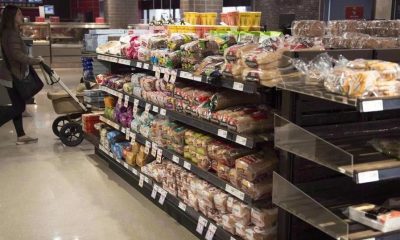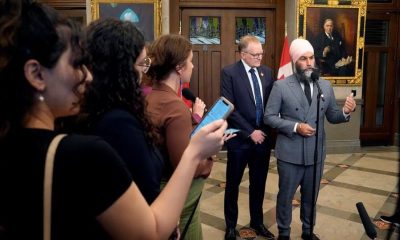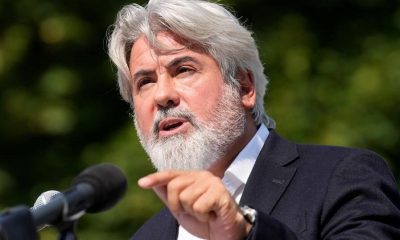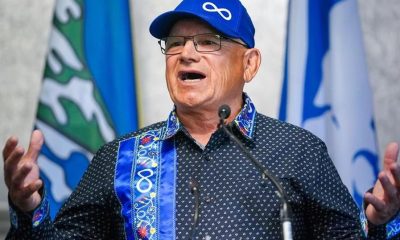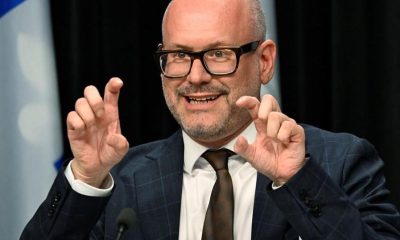Following MLA Melanie Mark’s announcement she plans to resign from elected office, her colleagues and First Nations leaders are calling for structural change to make the legislature more welcoming for Indigenous people and women.
Politics
What does Melanie Mark’s departure mean for Indigenous women in politics?
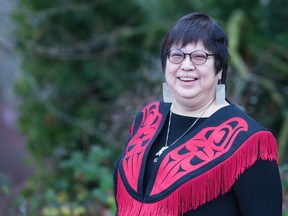
Judith Sayers, of the Nuu-Chah-Nulth Tribal Council, said she’s not surprised by Mark’s decision given that Indigenous people in positions of power face “really ingrained attitudes, biases, prejudice, racism and hatred.”
“It’s a big wall to scale” to change those attitudes, she said.
Describing the legislature as a “torture chamber” that is “allergic to doing things differently,” Mark said she was worn down by the attacks lobbed in the name of political points.

When Premier David Eby calls a byelection for Vancouver-Mount Pleasant, which must be held within six months of Mark’s resignation date, she said she’ll “do everything I can” to make sure another Indigenous woman runs as the NDP candidate.
Mark, who was raised by parents with addictions in the “projects” of East Vancouver, said she overcame “abject poverty” to fight for Indigenous people who are over-represented in jail and among the homeless community.
“That’s why I came in here to fight and we need more people like me coming in here to fight,” she told reporters Wednesday.
With her mother by her side, Mark said her resignation was especially difficult given her constituency includes the Downtown Eastside where her mother lives.
Jody Wilson-Raybould, Canada’s first Indigenous attorney general, left the Trudeau government during the SNC-Lavalin scandal and wrote a book, Indian in the Cabinet, that criticized the prime minister for a lack of progress on Indigenous reconciliation and criminal justice reform.
Experiences such as Mark’s “either sends people running in the other direction or maybe it makes someone say, ‘Hey, that’s not going to happen to me, I’m going to change this,’ ” Sayers said.
Mark, who is Nisga’a, Gitxsan, Cree and Ojibway, attended a Union of B.C. Indian Chiefs meeting Thursday at the Musqueam First Nation, where she took part in a blanketing and brushing off ceremony intended to bring her strength and protection.
Mark, a 47-year-old single mother who was elected in 2016 and served as tourism minister and minister of advanced education, also said her decision to leave politics was influenced by her desire to spend more time with her daughters, aged 12 and 19. Mark said in a CBC Early Edition interview Thursday morning she’d like to see more flexibility for politicians who opt to work from home so they can be with their kids.
“We need to take seriously the number of women who are leaving maybe prematurely from the work that they’re doing,” Furstenau said. “We have to ask ourselves about the the kind of conditions that politicians face and that women face as politicians. We need we need that diversity of representation.”
B.C. Liberal MLA Elenore Sturko said Mark’s resignation presents an opportunity to have a larger conversation about the experience of women in politics and the demands of travelling to the legislature in Victoria while leaving your kids and family behind.
Eby, who stood beside Mark at a press conference on Wednesday after her emotional speech in the house, pledged that the government will “do better” to become a more inclusive place for Indigenous women.
“People who have lived the life that Melanie Mark has, they are needed in this place,” Eby said. “And when she tells us what we need to do better, we need to listen, to understand and we need to act on it.”
Adam Olsen, B.C. Green MLA for Saanich North and the Islands and a member of Tsartlip First Nations, said while he doesn’t experience the legislature in the same way Mark did, he is “dismayed” by the concerns she brought up, saying it’s a “wake up call” for MLAs to collectively make it a safer space for people from diverse backgrounds.
“To think that we have gone from a handful of Indigenous people in this place to one less with the work that we’re doing right now (on reconciliation) it makes me sad,” he said.
Asked about Mark’s characterization that the Opposition was “awful” to her, particularly over her handling of the controversial $800-million plan to replace the Royal B.C. Museum, B.C. Liberal leader Kevin Falcon said he accepts that’s how Mark feels.
However, Falcon said the Opposition’s role is to ask hard questions of the government to keep them accountable and when it came to the Royal B.C. Museum plan — reversed by former premier John Horgan after public backlash — that’s what the Liberals did.

Politics
New Brunswick election candidate profile: Green Party Leader David Coon

FREDERICTON – A look at David Coon, leader of the Green Party of New Brunswick:
Born: Oct. 28, 1956.
Early years: Born in Toronto and raised in Montreal, he spent about three decades as an environmental advocate.
Education: A trained biologist, he graduated with a bachelor of science from McGill University in Montreal in 1978.
Family: He and his wife Janice Harvey have two daughters, Caroline and Laura.
Before politics: Worked as an environmental educator, organizer, activist and manager for 33 years, mainly with the Conservation Council of New Brunswick.
Politics: Joined the Green Party of Canada in May 2006 and was elected leader of the New Brunswick Green Party in September 2012. Won a seat in the legislature in 2014 — a first for the province’s Greens.
Quote: “It was despicable. He’s clearly decided to take the low road in this campaign, to adopt some Trump-lite fearmongering.” — David Coon on Sept. 12, 2024, reacting to Blaine Higgs’s claim that the federal government had decided to send 4,600 asylum seekers to New Brunswick.
This report by The Canadian Press was first published Sept. 19, 2024.
The Canadian Press. All rights reserved.
Politics
New Brunswick election profile: Progressive Conservative Leader Blaine Higgs

FREDERICTON – A look at Blaine Higgs, leader of the Progressive Conservative Party of New Brunswick.
Born: March 1, 1954.
Early years: The son of a customs officer, he grew up in Forest City, N.B., near the Canada-U.S. border.
Education: Graduated from the University of New Brunswick with a degree in mechanical engineering in 1977.
Family: Married his high-school sweetheart, Marcia, and settled in Saint John, N.B., where they had four daughters: Lindsey, Laura, Sarah and Rachel.
Before politics: Hired by Irving Oil a week after he graduated from university and was eventually promoted to director of distribution. Worked for 33 years at the company.
Politics: Elected to the legislature in 2010 and later served as finance minister under former Progressive Conservative Premier David Alward. Elected Tory leader in 2016 and has been premier since 2018.
Quote: “I’ve always felt parents should play the main role in raising children. No one is denying gender diversity is real. But we need to figure out how to manage it.” — Blaine Higgs in a year-end interview in 2023, explaining changes to school policies about gender identity.
This report by The Canadian Press was first published Sept. 19, 2024.
The Canadian Press. All rights reserved.
Politics
Climate, food security, Arctic among Canada’s intelligence priorities, Ottawa says
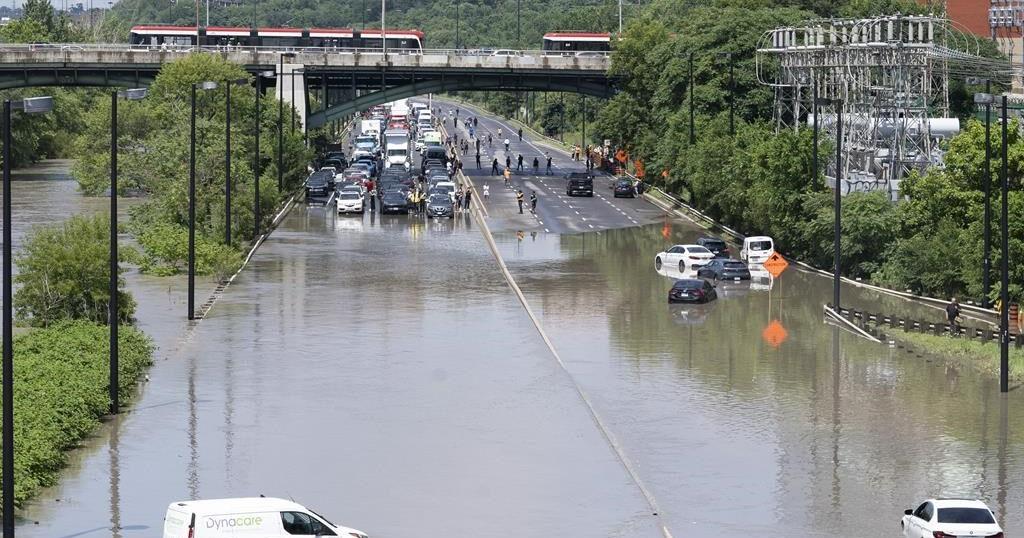
OTTAWA – The pressing issues of climate change and food security join more familiar ones like violent extremism and espionage on a new list of Canada’s intelligence priorities.
The federal government says publishing the list of priorities for the first time is an important step toward greater transparency.
The government revises the priorities every two years, based on recommendations from the national security adviser and the intelligence community.
Once the priorities are reviewed and approved by the federal cabinet, key ministers issue directives to federal agencies that produce intelligence.
Among the priorities are the security of global health, food, water and biodiversity, as well as the issues of climate change and global sustainability.
The new list also includes foreign interference and malign influence, cyberthreats, infrastructure security, Arctic sovereignty, border integrity and transnational organized crime.
This report by The Canadian Press was first published Sept. 19, 2024.
The Canadian Press. All rights reserved.
-

 Politics10 hours ago
Politics10 hours agoNew Brunswick Premier Blaine Higgs expected to call provincial election today
-
Media9 hours ago
Sutherland House Experts Book Publishing Launches To Empower Quiet Experts
-

 Sports5 hours ago
Sports5 hours agoArch Manning to get first start for No. 1 Texas as Ewers continues recovery from abdomen strain
-

 News21 hours ago
News21 hours agoAlberta Premier Smith aims to help fund private school construction
-

 Investment9 hours ago
Investment9 hours agoCanada’s Probate Laws: What You Need to Know about Estate Planning in 2024
-

 Politics8 hours ago
Politics8 hours agoNew Brunswick Premier Blaine Higgs kicks off provincial election campaign
-

 News10 hours ago
News10 hours agoQuebec won’t fund graphite mine project tied to Pentagon; locals claim ‘victory’
-

 Sports5 hours ago
Sports5 hours agoFormer Canada captain Atiba Hutchinson tells his story in ‘The Beautiful Dream”


